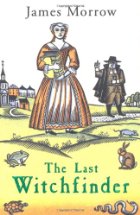Review: ‘The Last Witchfinder’ by James Morrow
Author: James Morrow
Published: Phoenix, 2006, pp. 573
Genre: Historical fiction
Blurb:In the spring of 1688, Walter Stearne, Witchfinder-General for Mercia and East Anglia, roams the countryside in search of heretics. His daughter Jennet is left behind in the care of her Aunt Isobel, who schools her in the New Philosophy expounded by Isaac Newton. But her aunt’s style of scientific enquiry soon attracts the attention of the witchfinders.
Jennet’s attempts to save her aunt are ultimately doomed, but she promises Isobel that she will devote her life to overturning the Parliamentary Witchcraft Act. Our heroine’s quest will entail many picaresque adventures, including a brush with the Salem Witch Trials, Indian captivity, erotic nights with Benjamin Franklin, a Caribbean shipwreck, and a final showdown between the old superstition and the new science.
When, where and why: I picked this book up several years ago in a wonderful remainders bookshop in Hay-on-Wye where all the books are £1 (I really must go back there soon). I read it now to fulfil the criterion ‘Read a historical fiction book about witches or the trial of witches’ for a book challenge in which I’m participating, and it counts for book 21/50 for my Books Off the Shelf Challenge.
What I thought: This is the book that I wasn’t enjoying to the extent of having to reward myself with another book just to get through it. It has become known as ‘the terrible book’ among friends and family, as that is how the poxy thing was referenced whenever I mentioned it. To put it mildly, I did not get on with this book at all.
My first problem is with the author’s premise that the story of Jennet Stearne has been written by Newton’s Principia Mathematica. I find the idea of books authoring other books to be entertaining, particularly the assertion that:
After Waiting for Godot acquired a taste for writing Windows software documentation, there was no stopping it. (p. 5)
However, amusing as this was, I don’t think that it adds anything to the story. Because the use of the book narrator is supposed to provide a perspective from the modern era on the advances made from Renaissance superstition to Enlightenment rationality (something I’m still not convinced it achieves), it doesn’t have a historical, Newtonian voice and so just sounds like the author putting his oar in every now and again and trying to be literary.
Although Principia claims to be in love with Jennet, the heroine of this book, I didn’t find her to be a very sympathetic character according to its portrayal. She displays near total disregard for her children and for most other people, subsuming everything to the pursuit of her scientific goal. While this may have been intended to make her seem purposeful and single-minded, I thought it made Jennet seem selfish and bloody-minded. It is difficult to relate to a character who discards children, husbands and lovers without much difficulty. As the rest of the characters are very much a supporting cast rather than having anything approaching equal weighting, this made the book a stuggle to read from the outset.
While Jennet is the one central character, she didn’t really have a distinct voice. The same was true for most of the characters; while there were obvious differences between those who championed science and rationality and those who clung to the old ways, no one character had an individual way of speaking or thinking. The groups of characters presented two sides of an argument, and that was all the distinction between them. Equally annoying was the consciously archaic speech. I had barely read a chapter before the constant stream of “i’faith”, “e’en”, “‘sblood” and “’twas” littering the direct speech was wearing thin. ‘Sblood, ’tis a passing wonder I managed to read the whole thing, i’faith.
I think that part of my problem arises from the fact that James Morrow and I evidently have very different attitudes towards historical fiction. In the author’s note he states:
If my experience in composing The Last Witchfinder may be counted typical, then the writer of historical fiction derives no less delight from adhering to the facts of chosen era than he does from bending those facts in pursuit of some presumed poetic truth. (p. 544)
I appreciate that historical fiction is, well, fiction and I have no problems with authors taking some creative licence with actual events as long as they remain believable, particularly where fictional characters interact with real historical figures. I think it’s perfectly reasonable for an author to have his character be a lady in waiting to Queen Elizabeth or a soldier who fought alongside Henry V and spoke to him the night before the battle; having your character be marooned on a desert island with Benjamin Franklin for more than four years, bear his illegitimate son and then devise a plan with him to escape by fooling pirates with science crosses that line of believability just a smidgeon. Initially I was prepared to stretch my imagination and accept that a widow in the late seventeenth century might possess a large and current library and a vast array of scientific paraphernalia including a van Leeuwenhoek microscope, but the plot meanders and stalls and with each unusual circumstance and strangely convenient coincidence I found myself becoming less tolerant and more irritated with the turns the story was taking in the name of ‘poetic truth’.
In spite of the bizarre and implausible storyline, James Morrow has evidently done his historical research (apparently this took him seven years to write). Usually I appreciate a well-researched novel, but this book does not present it in a way which makes the information interesting or relevant. Instead of being woven into the story, it is delivered in large, self-conscious chunks of knowledge by the Principia, as if designed to show off how much research has been done in order to write this book. The other problem with this is that the story was so ridiculous that I don’t really trust any of these facts without double-checking them myself (particularly when the writer states in the author’s note that he has deliberately changed some details) and they are far too many, varied and, quite frankly, dull for me to want to do that.
Where this book goes: I disliked this book so much that I listed it on BookMooch before I had even finished it to provide myself with encouragement to actually finish it now rather than letting it linger with a hundred pages or so to go. Amazingly, someone has requested it already, so it’s been packaged up to send to a new home and to clear some space for other, better books on my shelves.
Tea talk: I keep forgetting to bring some new tea leaves into work with me, so I’ve actually been accompanying this book with coffee (boo, hiss). It was too bad to waste good tea on anyway.
3 Responses to “Review: ‘The Last Witchfinder’ by James Morrow”
Comment from PolishOutlander
Time September 21, 2010 at 3:10 pm
I really enjoyed this one actually. Probably because of its weirdness, in that it is a book narrating the story and that the story goes from witchhunts in England, to the colonies and Ben Franklin. I know my husband didn’t care much for it though, probably for the same reasons you didn’t either. None of the author’s other books have interested me, but this one is high up there on my list of favorite/well remembered books.
Comment from oldenglishrose
Time September 21, 2010 at 4:01 pm
Looking at the reviews it does seem to be something of a marmite book. I’m glad you enjoyed it and that it’s gone on to another reader who will hopefully also enjoy it. I have his ‘The Philosopher’s Apprentice’ also waiting to be read and I’m now rather nervous about approaching it.


Comment from Laura
Time September 18, 2010 at 7:24 pm
Oh dear. Shan’t be reading that then!
Have started blogging my way through my own way off-the-shelf challenge (less of a specific challenge, more of a just-read-these-bloody-books): http://decidedlybookish.wordpress.com/
xxx